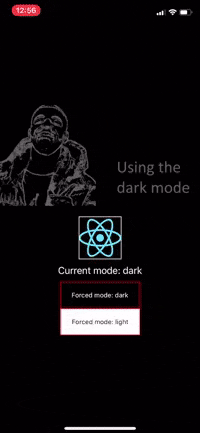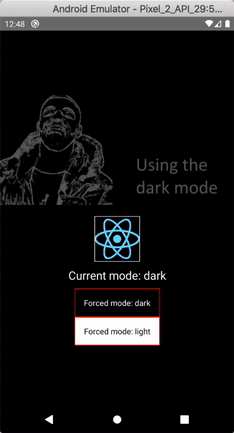react-native-dynamic
Installation
npm install react-native-dynamicUsage
useDarkMode
Returns a boolean. true when dark mode is on.
import { useDarkMode } from 'react-native-dynamic'
function Component() {
const isDarkMode = useDarkMode()
return <View style={{ backgroundColor: isDarkMode ? 'black' : 'white' }} />
}DynamicValue
A helper class meant to be used with DynamicStyleSheet and useDynamicValue. The first argument is the value to be used with a light color scheme, the second argument is the value to be used with a dark color scheme.
import { DynamicValue } from 'react-native-dynamic'
const backgroundColor = new DynamicValue('white', 'black')DynamicStyleSheet
Just like StyleSheet but with support for dynamic values.
import { DynamicStyleSheet, DynamicValue, useDynamicValue } from 'react-native-dynamic'
const dynamicStyles = new DynamicStyleSheet({
container: {
backgroundColor: new DynamicValue('white', 'black'),
flex: 1,
},
text: {
color: new DynamicValue('black', 'white'),
textAlign: 'center',
},
})
function Component() {
const styles = useDynamicValue(dynamicStyles)
return (
<View style={styles.container}>
<Text style={styles.text}>My text</Text>
</View>
)
}ColorSchemeProvider
Allows you to set a specific mode for children.
import { ColorSchemeProvider } from 'react-native-dynamic'
function MyScreen() {
return (
<>
{/* will be rendered using dark theme */}
<ColorSchemeProvider mode="dark">
<Component />
</ColorSchemeProvider>
{/* will be rendered using light theme */}
<ColorSchemeProvider mode="light">
<Component />
</ColorSchemeProvider>
{/* will be rendered using current theme */}
<Component />
</>
)
}It is recommended to wrap your application in a ColorSchemeProvider without a mode prop to observe a performance improvement.
function App() {
return (
<ColorSchemeProvider>
{/* ... */}
</ColorSchemeProvider>
)
}useDynamicValue
Returns the appropriate value depending on the theme. You can either pass a DynamicValue, an object containing dark and light properties, or just two arguments.
import { DynamicValue, useDynamicValue } from 'react-native-dynamic'
const lightLogo = require('./light.png')
const darkLogo = require('./dark.png')
const logoUri = new DynamicValue(lightLogo, darkLogo)
function Logo() {
const source = useDynamicValue(logoUri)
return <Image source={source} />
}import { useDynamicValue } from 'react-native-dynamic'
function Input() {
const placeholderColor = useDynamicValue('black', 'white')
return <TextInput placeholderTextColor={placeholderColor} />
}import { useDynamicValue } from 'react-native-dynamic'
const datePickerConfig = {
light: {
backgroundColor: 'white',
color: 'black',
},
dark: {
backgroundColor: 'black',
color: 'white',
},
}
function CustomDatePicker() {
const config = useDynamicValue(datePickerConfig)
return <DatePicker config={config} />
}useColorSchemeContext
Returns dark or light but reads value from context.
import { useColorSchemeContext } from 'react-native-dynamic'
const backgroundColors = {
light: 'white',
dark: 'black',
}
function Component() {
const mode = useColorSchemeContext()
const backgroundColor = backgroundColors[mode]
return <View style={{ backgroundColor }} />
}Requirements
- React Native >0.62





